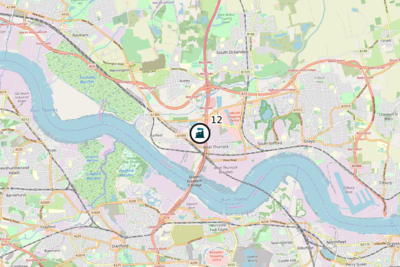Purfleet Cement Kiln
Purfleet Cement Kiln is located in West Thurrock and is owned by Kerneos.
| Purfleet Cement Kiln | |
 See Cement Kilns → page for a larger UK Wide map. | |
| Waste Licence | None |
| Operator | Kerneos |
| Parent Company | Imerys Aluminates |
| Clinker Capacity | 0 Mt |
Summary site information collated from a variety of sources.

Overview
Whilst the other cement kilns listed on WikiWaste focus on Portland Cement, the Purfleet cement kiln is focused on the production of High Alumina Cement (HAC) also known as calcium aluminate cement (CAC). HAC was first developed by Lafarge in the UK in 1925 for applications that required a resistance to chemical attack. After five high profile failures in the 1970s the cement ceased use in structural concrete [1]. There is little further information available about the site in the public domain, although general listings of the product range are available on the Imerys Alumninates website [2], with Ciment Fondu® being the 'most versatile of all Imerys Aluminates products' being used as:
- a reagent in formulated products
- an hydraulic binder base for refractory and specialty concrete
- an accelerator for Portland cement
Ownership
The following companies are listed at the site in Dolphin Way[3]:
- 1992 Lafarge Aluminates International Ltd
- 1995 Lafarge Aluminates Cement Company Ltd
- 2006 Lafarge Aluminates Ltd
- 2018 Kerneos Ltd (owned by Imerys Aluminates Ltd)
The Process at Purfleet
The cement kiln is focused on producing a HAC which is composed of calcium aluminates, rather than Portland cement which is composed of calcium silicates.
Raw Materials
The primary raw materials are limestone or chalk and bauxite.
Waste Used on Site
There is no information that suggests any waste materials are used in the production of cement on the site.
